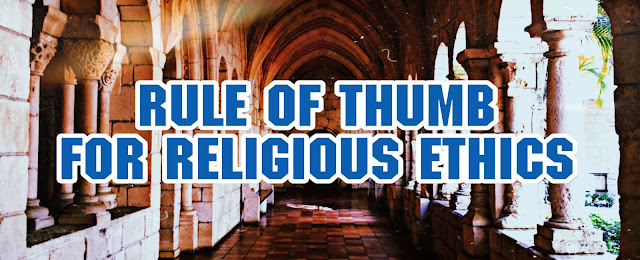Someone named Publicola wrote to the great Augustine, Bishop of Hippo, asking: If a Christian is starving and on the point of death, and they see food in an idol’s temple, may they eat it?
Augustine replied: ‘It is better to reject it with Christian fortitude’.
This same Augustine who wrote the magisterial City of God was also the one who penned:
‘That all superstition of pagans and heathens should be annihilated is what God wants, God commands, God proclaims!’
As we compare Augustine to some of today's well-known leaders of religions, we can notice the same worldview that leads to extremism.
We humans have natural tendency to create imaginary divine laws.
How often we hear religious teachers say, "This is God's laws, we must follow out of gratitude"?
Perhaps the rule of thumb to discern what is divine or not is whether the rule celebrates tangible signs of human flourishing such as life, joy, friendship, self-responsibility and social bond.
Dying from starvation by rejecting available food is against the celebration of life.
Annihilating other widely accepted religious beliefs is against the celebration of joy and friendship.
Extremism that raises racial or religious wall to separate people is against healthy social bond.
As Kenan Malik observes: "Moral questions may not have objective answer but they do have rational ones, answers rooted in a rationality that emerges out of social need."
Doctrines and religious teachings have to be thought through this rule of thumb. If not, one would go down the path of extremism like what is happening around today.
How this rule is connected to divinity is up to each religion's interpretation.
The point is that, this rule of thumb at least sets the boundary where teachings that are outside of it is probably not divine.
I can't imagine a divine commandment in the present era that requires people to go against life, joy, friendship, self-responsibility and social bond.
Augustine replied: ‘It is better to reject it with Christian fortitude’.
This same Augustine who wrote the magisterial City of God was also the one who penned:
‘That all superstition of pagans and heathens should be annihilated is what God wants, God commands, God proclaims!’
As we compare Augustine to some of today's well-known leaders of religions, we can notice the same worldview that leads to extremism.
We humans have natural tendency to create imaginary divine laws.
How often we hear religious teachers say, "This is God's laws, we must follow out of gratitude"?
Perhaps the rule of thumb to discern what is divine or not is whether the rule celebrates tangible signs of human flourishing such as life, joy, friendship, self-responsibility and social bond.
Dying from starvation by rejecting available food is against the celebration of life.
Annihilating other widely accepted religious beliefs is against the celebration of joy and friendship.
Extremism that raises racial or religious wall to separate people is against healthy social bond.
As Kenan Malik observes: "Moral questions may not have objective answer but they do have rational ones, answers rooted in a rationality that emerges out of social need."
Doctrines and religious teachings have to be thought through this rule of thumb. If not, one would go down the path of extremism like what is happening around today.
How this rule is connected to divinity is up to each religion's interpretation.
The point is that, this rule of thumb at least sets the boundary where teachings that are outside of it is probably not divine.
I can't imagine a divine commandment in the present era that requires people to go against life, joy, friendship, self-responsibility and social bond.
Contemporary books introducing any particular global religion testify to this. They assume this rule of thumb and condemn extremism or fanatical interpretation of that religion. True version of their religion, they say, is against death, despair, enmity, self-recklessness and disintegrate society. They all promote their respective religion as celebrating the rule of thumb.
